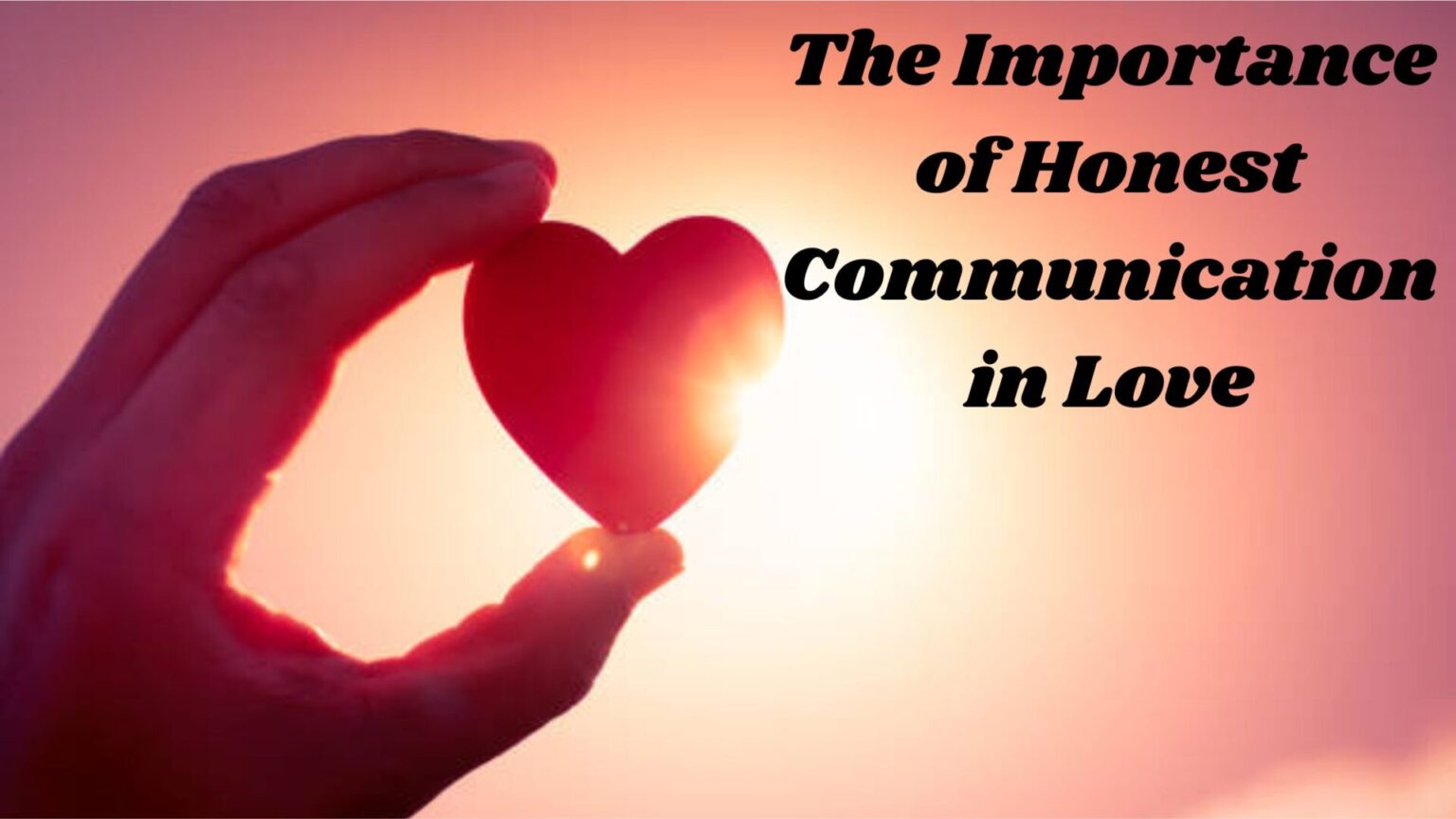Introduction:
Whispers of the Heart: The Importance of Honest Communication in Love

In the realm of romance, where emotions run deep and connections flourish, honest communication stands as the cornerstone of every enduring bond. Like gentle whispers that echo the sentiments of the heart, transparent dialogue nurtures trust, understanding, and intimacy between partners. In this article, we delve into the significance of embracing honest communication in love and how it shapes the foundation of healthy, fulfilling relationships.
Why is honest communication important in romantic relationships?
Honest communication is crucial in romantic relationships for several reasons:
- Building Trust: Honest communication fosters trust between partners. When individuals feel safe to express themselves openly and honestly, it creates a foundation of trust, which is essential for the health and longevity of the relationship.
- Understanding and Connection: Honest communication allows partners to understand each other’s thoughts, feelings, and needs more deeply. By sharing openly, couples can connect on a deeper level and develop a stronger emotional bond.
- Resolving Conflict: Inevitably, conflicts arise in relationships, but honest communication provides a constructive way to address and resolve them. When partners communicate openly and respectfully about their concerns and perspectives, they can work together to find solutions and strengthen their relationship in the process.
- Preventing Resentment: Without honest communication, unresolved issues can fester and lead to resentment over time. By addressing concerns openly and honestly as they arise, couples can prevent resentment from building up and damaging the relationship.
- Promoting Intimacy: Honest communication fosters intimacy by creating a safe space for vulnerability and authenticity. When partners feel comfortable expressing their true selves without fear of judgment or rejection, it deepens their emotional connection and intimacy.
Overall, honest communication lays the groundwork for a healthy, fulfilling romantic relationship by promoting trust, understanding, and connection between partners.
How can couples improve their communication skills?
Couples can improve their communication skills through various strategies and practices:

- Active Listening: Practice active listening by giving your partner your full attention when they speak. This means maintaining eye contact, nodding to show understanding, and refraining from interrupting. Reflect back what your partner has said to ensure you understand their perspective accurately.
- Expressing Yourself Clearly: Clearly express your thoughts, feelings, and needs using “I” statements. Instead of blaming or accusing your partner, focus on how you feel and what you need in the relationship. Be specific and direct in your communication to avoid misunderstandings.
- Empathy and Understanding: Practice empathy by putting yourself in your partner’s shoes and trying to see things from their perspective. Validate their feelings and experiences, even if you don’t agree with them. Show understanding and compassion towards your partner’s emotions and concerns.
- Resolving Conflict Constructively: When conflicts arise, approach them with a constructive mindset. Focus on finding solutions rather than assigning blame. Use “we” language to emphasize that you’re both in it together. Take breaks if emotions escalate, but commit to returning to the conversation later to find resolution.
- Nonverbal Communication: Pay attention to nonverbal cues such as body language, tone of voice, and facial expressions. These can convey emotions and messages that may not be expressed verbally. Be mindful of your own nonverbal communication and how it may impact your partner.
- Seeking Feedback: Ask for feedback from your partner about your communication style. Be open to constructive criticism and use it as an opportunity for growth. Discuss together how you can both improve your communication skills and support each other in the process.
- Practice Patience and Understanding: Communication skills take time to develop, so be patient with yourselves and each other. Celebrate progress and small victories along the way. Remember that communication is an ongoing process that requires effort and commitment from both partners.
- Seeking Outside Help: Consider seeking couples therapy or counseling if you’re struggling to improve your communication skills on your own. A qualified therapist can provide guidance, tools, and techniques tailored to your specific needs and help you navigate challenges more effectively.
What role does trust play in honest communication?
Trust plays a fundamental role in honest communication within romantic relationships. Here’s how:

- Creating a Safe Environment: Trust creates a safe space for partners to express themselves openly and honestly without fear of judgment or repercussion. When individuals trust that their thoughts, feelings, and vulnerabilities will be respected and valued, they are more likely to communicate authentically.
- Fostering Transparency: Trust encourages transparency in communication. When partners trust each other, they are more inclined to share their innermost thoughts, feelings, and experiences without holding back. This transparency allows for deeper understanding and connection between partners.
- Building Reliability: Trust in a relationship is built on reliability and consistency. When partners consistently demonstrate honesty and integrity in their communication, it reinforces trust and strengthens the bond between them. Trustworthy behavior builds confidence in each other’s words and actions, fostering a sense of security and stability in the relationship.
- Promoting Emotional Intimacy: Trust is essential for the development of emotional intimacy in relationships. When partners trust each other, they feel comfortable being vulnerable and opening up about their deepest emotions and insecurities. This emotional intimacy deepens the connection between partners and enhances the quality of their communication.
- Resolving Conflict: Trust is crucial for effective conflict resolution. When partners trust each other, they are more willing to engage in difficult conversations and address conflicts openly and honestly. Trust enables partners to communicate constructively, listen empathetically, and work together to find mutually acceptable solutions.
Overall, trust is the foundation upon which honest communication is built in romantic relationships. It creates a supportive environment where partners feel secure, understood, and valued, enabling them to communicate authentically and deepen their connection with each other.
Conclusion:
In the symphony of love, honest communication serves as the melody that resonates in the hearts of partners, guiding them towards deeper connection, understanding, and intimacy. By embracing transparency, authenticity, and vulnerability, couples can nurture a relationship that thrives on trust, mutual respect, and unwavering support. As we heed the whispers of the heart and communicate with honesty and openness, we embark on a journey of love that is as enriching as it is enduring.
FAQs (Frequently Asked Questions):
- What should I do if my partner and I have different communication styles?
- It’s common for partners to have different communication styles, but understanding and respecting these differences is key. Couples can bridge the gap by openly discussing their communication preferences, being patient and empathetic with each other, and finding common ground that works for both parties.
- How can I address sensitive topics with my partner without causing conflict?
- When discussing sensitive topics, it’s essential to approach the conversation with empathy, respect, and honesty. Choose an appropriate time and place to talk, use “I” statements to express your feelings without blaming or accusing your partner, and actively listen to their perspective without judgment.
References:
- Gottman, John M., and Nan Silver. “The Seven Principles for Making Marriage Work.” Harmony, 2015.
- Hendrix, Harville, and Helen LaKelly Hunt. “Getting the Love You Want: A Guide for Couples.” Holt Paperbacks, 2007.
- Markman, Howard J., Scott M. Stanley, and Susan L. Blumberg. “Fighting for Your Marriage: A Deluxe Revised Edition of the Classic Best-seller for Enhancing Marriage and Preventing Divorce.” Jossey-Bass, 2010.
- Gottman, John M., Julie Schwartz Gottman, and Douglas Abrams. “Eight Dates: Essential Conversations for a Lifetime of Love.” Workman Publishing Company, 2019.
- Chapman, Gary D. “The 5 Love Languages: The Secret to Love that Lasts.” Northfield Publishing, 2015.
- Schnarch, David. “Passionate Marriage: Keeping Love and Intimacy Alive in Committed Relationships.” Holt Paperbacks, 2009.
- Johnson, Sue. “Hold Me Tight: Seven Conversations for a Lifetime of Love.” Little, Brown Spark, 2008.






